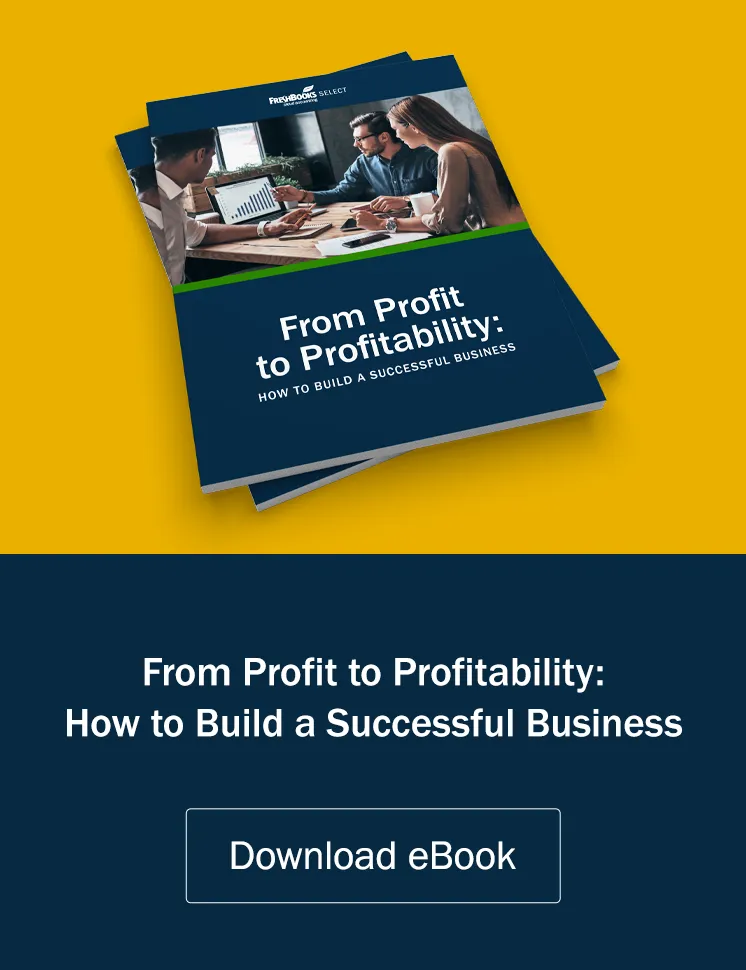Learn why opening a separate business bank account is crucial for your business and your financial sanity.

When you start a business, you’re always looking for ways to simplify things. You might set up an online calendar so clients can easily book meetings with you or outsource administrative tasks you don’t enjoy doing.
You might Google things like: “Do I need a business bank account?” The short answer is, yes!
As a small business owner, when it comes to managing your finances, you should open a business bank account. Keeping your business expenses separate from your personal account makes managing your small business’ finances easier, especially as your business grows.
Here’s what you need to know about the key benefits of having a separate business bank account and what to consider when choosing the right business checking account for your company. From tax purposes to maintaining legal protection, a business checking account helps ensure your business transactions are kept separate from your personal transactions. You’ll also be able to accept credit card payments more easily, improve your cash flow, and set up merchant services—all critical for your business’s growth.
Table of Contents
What Is a Business Bank Account Used For?
A business bank account is specifically used for transactions related to your business. You can have both a business checking account and a business savings account.
Having a separate business bank account makes it easier to distinguish between your personal and business transactions, simplifying your bookkeeping process. By keeping business funds separate from your personal account, you’ll be able to manage your personal and business finances with greater efficiency.
5 Benefits of a Business Bank Account
Here are the top reasons why you should open a business bank account for all your business finances:
1. Limit Your Personal Liability
When starting a business, many business owners choose to form a limited liability company (LLC) or a corporation to protect their personal assets. This separation ensures that your personal assets remain protected from business liabilities. However, to maintain this protection, you must follow certain guidelines. One important rule is to keep your personal and business finances separate.
Opening a separate business and personal bank account helps you maintain this separation, keeping your business and personal finances distinct and ensuring your business remains legally protected.
2. Organize Your Business Records
It may seem simpler to combine your business money and personal funds in one checking account, but doing so can make your bookkeeping much more difficult, especially during tax season.
It’s challenging to accurately track your business expenses when they’re mixed with your personal credit card transactions too. You could end up spending hours sorting through personal bank account records just to find a few business-related expenses. Worse, you might miss out on important business tax deductions, which could cost you a lot when tax season rolls around.
Opening a business account separate from your personal account will simplify your tax preparation and help you stay on top of your business finances year-round.
3. Establish Credibility With Clients
When building trust with clients and future clients, it’s important to treat your business like a business—not like an extension of your personal life. When you’re running a small business, it can look unprofessional to pay your contractors with a personal check or have your clients write a check to you as an individual.
Will this lose you business? Maybe not. But having a dedicated business banking account that’s separate from your personal accounts shows that you’re a serious professional. This is especially important as you scale your operations and evolve from freelancer to business owner.
4. Monitor Business Progress
To keep your business on track, you need to regularly monitor your progress. Tracking your business financials is one of the best ways to do this.
By keeping your business account separate from your personal account, you can easily check your business transactions and financial records. This helps you stay on top of your cash flow and make informed decisions for future growth.
5. Hobby or Business?
The IRS has 9 factors that determine whether your business is actually a business or whether it’s really just a hobby. The first factor on that list is: “Whether you carry on the activity in a businesslike manner, and maintain complete and accurate books and records.”
Having a separate business account makes it much easier to prove that your venture is a legitimate business, not just a hobby. This helps you avoid potential tax issues and ensures your business is recognized as a legitimate entity.
What Is a Good Bank for a Business Account?
When choosing the right business account for your company, it’s essential to evaluate the features that will best support your needs. Not all banks are created equal when it comes to business banking, so consider what your business needs in terms of fees, transaction limits, ease of use, and integration with your other business tools. Here are some key things to look for when deciding where to open a business bank account:
- Fees: Some banks charge various fees, such as monthly maintenance fees, fees for depositing checks, or fees for maintaining a low balance. Before committing to a business checking account, make sure to request a detailed list of fees. This will help you avoid any surprises down the road.
- Minimum Balance Requirements: Some banks require a minimum balance to avoid monthly fees. This can be challenging for new or small businesses, so consider looking for a bank that has no minimum balance requirement, or one that offers a low balance threshold.
- Transaction Limits: If your business frequently deals with cash or check deposits, you’ll want to check for transaction limits on your account. Some banks have daily or monthly transaction limits, which could result in additional fees. Choosing a bank with no or high transaction limits can save you money and hassle.
- Additional Debit Cards: If you plan to give employees access to your business funds, make sure the bank offers the ability to issue additional debit cards. Ideally, the bank will allow you to set limits on how much an employee can spend, so you retain control over your business funds.
- Ease of Integration: Look for a bank that integrates easily with your business accounting software, such as QuickBooks or FreshBooks. This integration can streamline your business finances, making it easier to manage your monthly transactions, reconcile business expenses, and prepare for tax season.
What Do You Need to Open Your First Business Bank Account?
Before you head to the bank to open a business account (whether in person or online), gather the necessary documents. The required information may vary depending on your business structure, but here’s a list of common documents needed to to open a business bank account:
- Employer Identification Number (EIN) or Federal Tax ID: If your business is a sole proprietorship, you may not need an EIN, but you can still use one if you have it. For LLCs, corporations, and other business entities, you’ll need to provide an EIN to open your account.
- Articles of Organization or Incorporation: If your business is an LLC or a corporation, you’ll need to provide the articles of organization or incorporation filed with your state.
- Certificate of Good Standing: Some banks may require a certificate of good standing from your state, which verifies that your business is up to date on taxes and legal requirements.
- Personal Identification: Just like opening any bank account, you’ll need to provide personal identification, such as a driver’s license or passport, to verify your identity.
- Copy of Your DBA (Doing Business As) Filing: If you operate under a business name that’s different from your legal name (a DBA), you’ll need to show the bank proof of your filing.
- Copy of Partnership Agreement: If your business is a partnership, the bank will likely ask for a copy of the partnership agreement that outlines the roles and responsibilities of each partner.
- Business License: Depending on where your business is located, you may need to provide a copy of your business license to show you’re legally authorized to operate in your area.
Are There Situations When You Don’t Need a Business Bank Account?
If you’re a sole proprietor, you’re technically not legally required to have a separate business account. However, having a business checking account is still highly recommended. Even though a sole proprietorship doesn’t offer personal liability protection, separating your personal and business funds can make a huge difference. Here’s why:
- Organization and Financial Tracking: Having a separate business bank account will help you stay organized, track business expenses, and monitor your business’s financial health. It’ll also make tax preparation easier, as you won’t have to sift through personal transactions to find business-related expenses.
- Credibility: When clients and vendors see that you have a dedicated business account, it shows you’re a legitimate business, not just a hobby. This can help you build trust and professionalism, especially as your business grows.
- Financial Monitoring: By separating your business and personal accounts, you’ll have a clear view of your business income, expenses, and cash flow. This is crucial for monitoring your business’s financial progress and ensuring that you’re spending money wisely.
A Last Thought on Business Bank Accounts
Opening a separate business bank account is a crucial step in establishing your own business. It helps separate your business and personal finances, which is not only essential for organization but also for tax purposes. As your small business grows, a dedicated business account will provide a solid foundation for managing your business assets, cash flow, and tax preparation.
By opening a business account, you’ll also help establish your business’s credit history, which can be invaluable if you ever need to apply for a business loan or line of credit. A business checking account can be a key tool for your business’s financial health and growth, especially when paired with other banking services like merchant services for accepting credit card payments and setting up automated bill payments.
This post was updated in January 2025.

Written by Erica Gellerman, Freelance Contributor
Posted on March 13, 2017
This article was verified by Janet Berry-Johnson, CPA and Freelance Contributor

 What is Your Working Capital Ratio and How Do You Calculate It?
What is Your Working Capital Ratio and How Do You Calculate It? Better Budget Management: How to Stick to a Budget
Better Budget Management: How to Stick to a Budget Manual Tracking vs. Cloud Accounting: How Much Time You Actually Save
Manual Tracking vs. Cloud Accounting: How Much Time You Actually Save


![How to Choose the Right Bookkeeping Service [Free Checklist] cover image](https://www.freshbooks.com/blog/wp-content/uploads/2018/10/Checklist-Hero@2x-226x150.jpg)


